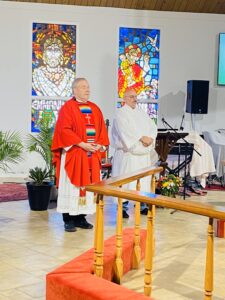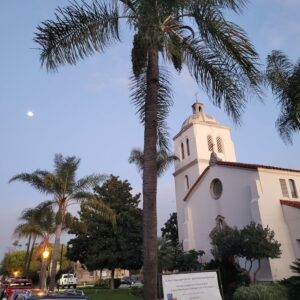Many Sunday mornings, the Rev. Bill Garrison performs double duties, celebrating the Eucharist at 7:30 a.m. and 11 a.m. at St. Andrew’s and at 9 a.m. at Emmanuel churches in Fullerton. Recently, he juggled bishop’s visitations — with different bishops — the same day at each.
“I enjoy the people, I enjoy the services,” said Garrison, 74, who retired a few years ago as rector of St. Matthias Church in Whittier and now bounces between the two Fullerton churches — about 11 miles apart — in a day’s service.
“I’m having a great time,” Garrison told The Episcopal News in a recent telephone interview.
“Multipoint ministries” like Garrison’s, where two or more congregations share a priest, are just one of the ways to address growing clergy shortages in mainline denominations, including The Episcopal Church, he said.
“We have this idea that we’re on the Titanic and the band’s still playing but that we’re heading to the bottom. It’s not true. We can build churches and be healthy, if we get rid of the idea that things are hard and it’s never going to get better. I know what we do is not easy, but it could be more fun, and we can succeed at it.”
For the Rev. Tom Quijada-Discavage, diocesan Canon for Formation and Transition Ministry, who matches clergy with congregations, “the work ain’t easy, for congregations in transition,” or for him. “Bishop Taylor will say, ‘none of us has a magic wand to wave over the top and change it. We just have to move incrementally forward’.”
Faced with the reality that more than a third — at least 55 out of 133 — of the congregations in the Los Angeles diocese will be without regular clergy this year, Discavage agrees that creativity, flexibility, and patience, are necessary, because transitional periods are taking longer, and fewer candidates are applying for positions.
“I used to say transitions were a 12-to-15-month process by the time you get the paperwork, and everything done,” he said. “Now it’s minimally 15 months and we have some that have extended into a second year or more.”
Empowered laity, creativity and flexibility have been essential for some churches, like St. Mark’s in Downey, which had closed a school and was unable to afford either full- or part-time clergy but has now been able to plan an affordable housing project on its campus, potentially offering long-term financial stability, said senior warden Dan Vaughn.
The congregation engages a supply priest three times a month; laity lead Morning Prayer other times, he said. The church recently added a streaming service for online viewers and enthusiasm is at an all-time high, even though completion of the 60-unit project is a few years away. The congregation, with a number of retired teachers, including Vaughn, hopes to designate 15 of those units for foster youth who age out of the system and have little, if any, resources to assist them, he said.
Support from the Rev. Michael Bell, director of housing and business development with Episcopal Communities & Services, a diocesan institution, “who has been shepherding us to do the right thing,” helped make it all happen, he said. “It really took off when he came in. He was able to narrow it down to what we needed to do, and we are probably within a month of having a ground license option for the vestry to look at and to give to the diocese to approve. We’re close.”
The efforts have taken both resilience and dedication, Vaughn said. “Things come along, and we deal with them, because that’s what we’ve had to do. We’re a very positive, forward-looking group,” he added. “We’re not a ‘oh, woe is me, we’re down in numbers and we don’t have much money, what are we going to do? kind of group. We’re very dedicated to St. Mark’s.”
Recently, the congregation revived a formerly popular “Lobsterfest” fundraiser, shipping lobster from Maine, which raised about $7,000, he added. “We sold out of the lobsters. We had a full house; it was a wonderful event.”
Similarly, JoAnn Newton, senior warden at St. Paul’s Church in Pomona said once the congregation began focusing outward, joy, attendance and enthusiasm began to grow.
“We’ve stopped feeling sorry for ourselves and we’re just doing it, just moving ahead for whatever the Lord’s will is for St. Paul’s,” she told The Episcopal News recently.
The congregation, though small, is mighty in Spirit, she added. “We’re blessed with a vestry that’s very strong. Everybody has a different talent that they bring to the table and that really helps.”
Recently, they hosted “A Day of Healing for the Immigrant” community, after receiving a grant from the local nonprofit, Tri-City Mental Health Association. The day was intended to alleviate stress created by the recent federal crackdown on immigration and deportations, especially timely after Immigration Customs Enforcement (ICE) agents detained ten people April 22 outside a Pomona Home Depot, she said.
Only one participant showed up, because of fear of another ICE raid, she believes, but the congregation is undeterred, she said. They are planning to host yet another event, a mini-healing day with counselors, meditation circles, facials and other soothing spa-type treatments.
“I said, okay, that one person got blessed and the good news is, all of us who worked on this had a nice lunch together and we enjoyed each other,” Newton said. St. Paul’s is also hosting a June event, a Friday night film series “that tells the story of the LGBTQ community’s quest for equal rights. It’s really to educate the heterosexual community about what people have had to deal with,” she said, adding, “We’re a work in progress; but we’ve got a lot going on.
“We’re more than surviving,” she said. “We’re on the verge of thriving.”
The church administrator, Bill Laws, has earned worship leader certification and has taken chaplaincy training courses through Bloy House, the Episcopal Theological School at Los Angeles, which will help fill a gap with pastoral care, Newton said. “I’m counting on him getting into a position where he can provide pastoral care.”
Bloy House is offering “Sacred Leadership Training” for laity empowerment in an online summer session beginning May 26. Courses offered include preaching; storytelling; church governance; Episcopal identity; and introduction to the Bible. The six-week sessions are to be held one weeknight per week at 7 p.m., for one hour.
Diocesan teams are also being trained to support congregations through a “Requiem or Renaissance” program created in the Episcopal Diocese of Missouri which is being adapted for use in Los Angeles, said Discavage, a team member. “It is all congregational discernment and ultimately churches make the decision for what their possibilities are — a renaissance or requiem.”
For example, “not our church, but the Church of the Master, a Lutheran congregation in Lancaster, was in conversation with us about linking together for leadership possibilities,” he said. Through the process of discernment, the congregation realized they had concluded their ministry and were not going to continue it.
Another church, “in New York, was trying to figure out how to grab hold of whatever hope there was to restart its life and ministry,” Discavage said. “They either leased or sold their church to another organization, with the understanding they would be in part of the church building for worship. In the interim, they found a storefront where they began meeting and it brought new life and new hope.” They ultimately decided not to return to their former location but opted to stay in the storefront where they’d found new life, he said.
“These things take time to happen and there are lots of questions and arguments and ultimately, lots of hope for new life. I refuse to give up on hope,” he added. “This is a time for us to live in the truth of the resurrection, that all things are possible. That new life is what we hold to. It may be different or, at least a bit different, but it’s new life that is filled with hope and joy.”
Both St. Andrew’s and Emmanuel churches in Fullerton are experiencing new life, increased joy and attendance, Garrison said. Now, Emmanuel is preparing a profile and hoping to call a full-time priest.
Garrison, “brought just the right calm we needed,” said Marian Corral, Emmanuel’s senior warden, adding there were seven confirmations during Bishop Ed Little’s Feb. 29 official visitation.
“They are very different churches,” said Garrison, who hopes to continue serving until “I’m about 80. The main thing, for me, is just to remember where I am.”



